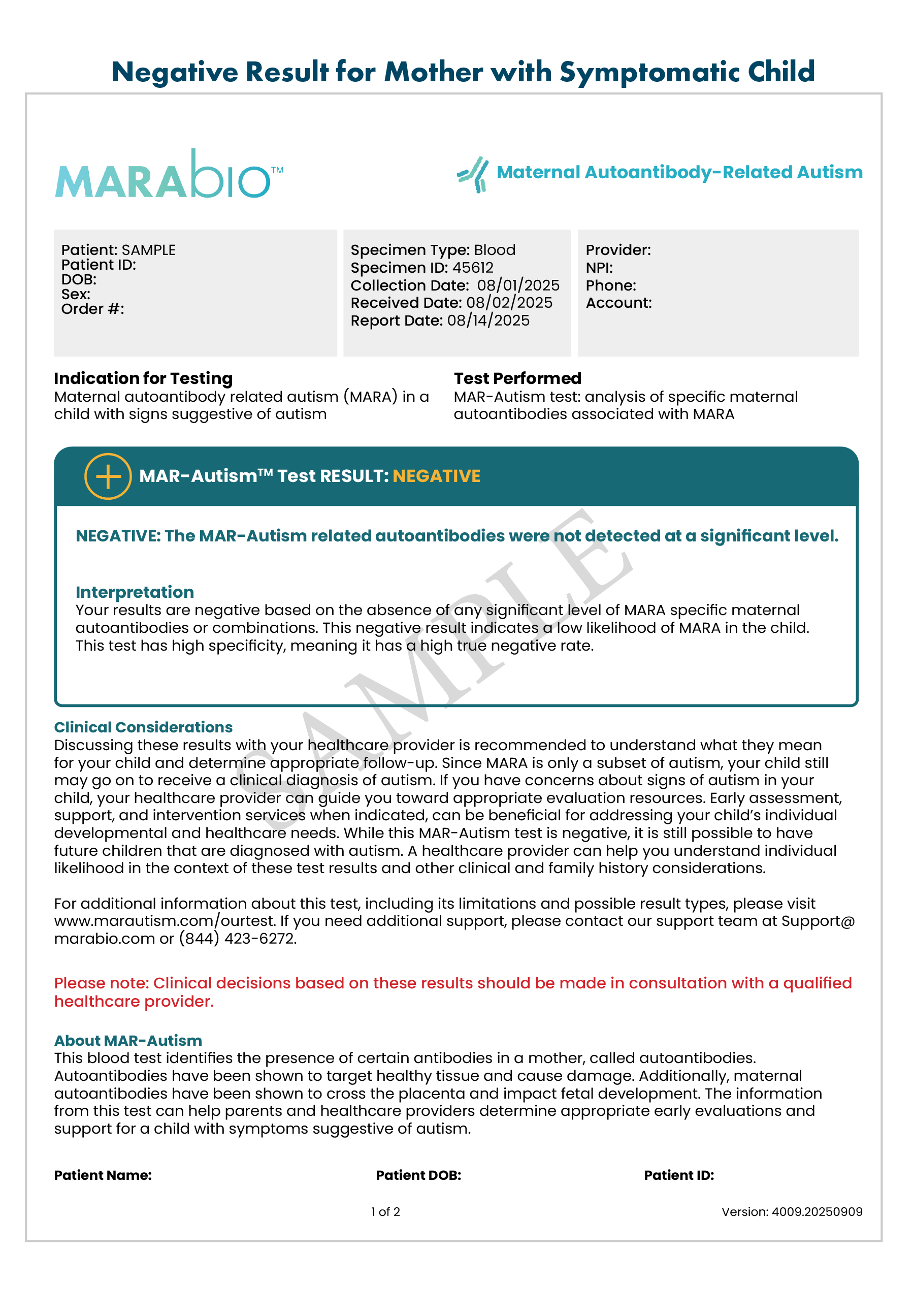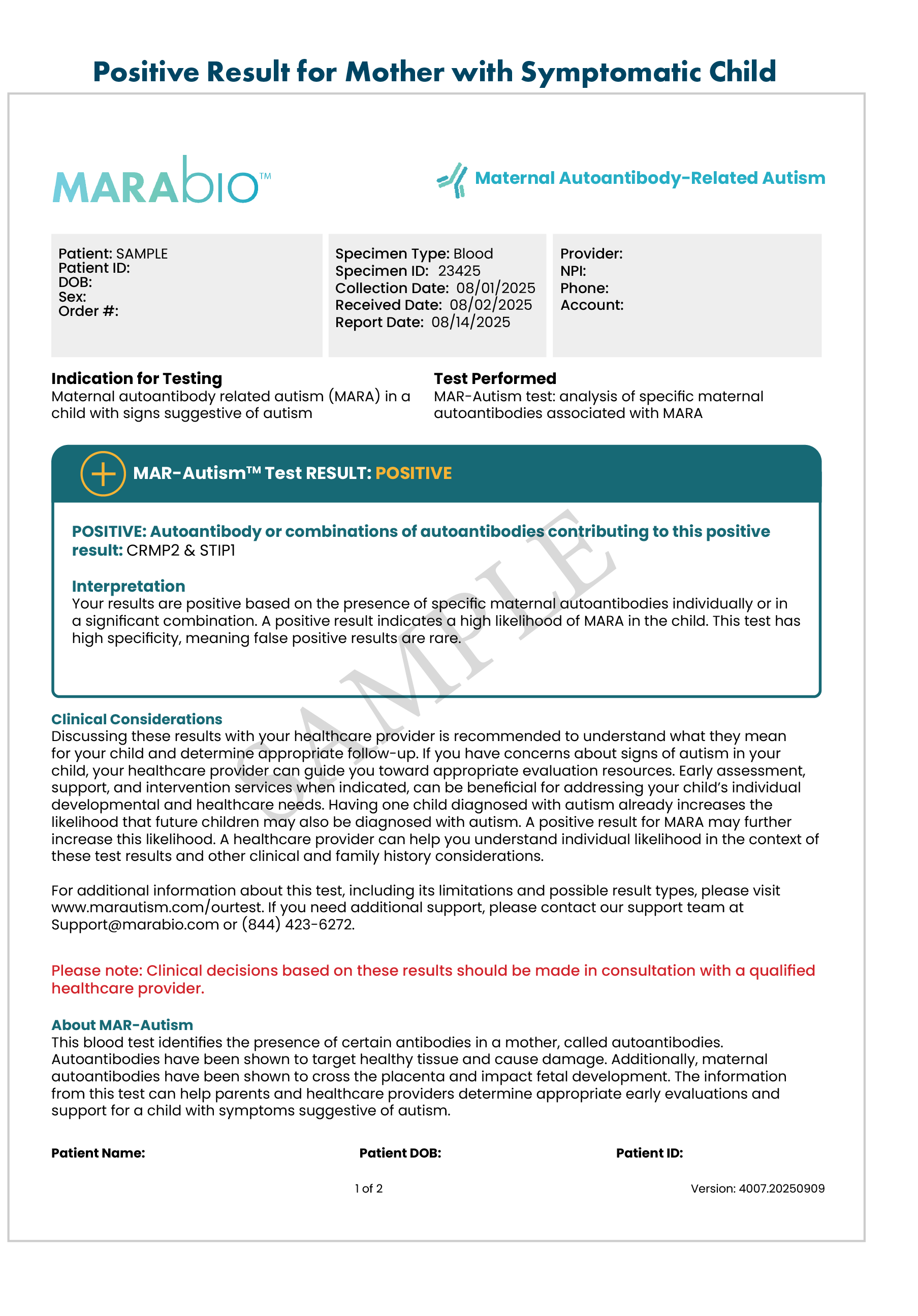
Partner with Us
Identify a biological mechanism for a subtype of autism (MAR-Autism™) in your patients.
With a specificity as high as 97%, the MAR-Autism™ Test helps providers identify children with a higher likelihood for an autism diagnosis for a specific subtype of autism due to maternal autoantibodies, enabling earlier referrals, targeted interventions, and more effective triage from long diagnostic waitlists. It also informs family planning and risk assessment for subsequent children, identifies a likely biological cause, and helps reach a definitive diagnosis sooner.1-3
About MAR-Autism
This blood test identifies the presence of certain antibodies in a mother, called autoantibodies. Specific maternal autoantibodies, which are proteins made by the immune system that can mistakenly target the body’s own tissues, are linked to a subtype called MARA or MAR-Autism. MAR-Autism is distinct from other contributing factors such as genetic or environmental influences and may account for up to 20% of autism cases. The MAR-Autism test detects specific maternal autoantibodies associated with a very high likelihood for a child to receive an autism diagnosis (approximately 260% to 300% more likely). By identifying this immune-related risk factor, the test provides valuable information to help guide earlier evaluation and care.
The test uses an enzyme-linked immunosorbent assay (ELISA) to analyze plasma collected in Acid Citrate Dextrose (ACD) tubes from mothers who have at least one child diagnosed with, or showing symptoms of, autism spectrum disorder (ASD).1 The assay detects maternal autoantibodies to six proteins:
Collapsin response mediator proteins 1 and 2 (CRMP1, CRMP2)
Lactate dehydrogenase A and B (LDHA, LDHB)
Stress-induced phosphoprotein-1 (STIP1)
Y-box binding protein 1 (YBX1)
The presence of these autoantibodies either individually or in specific combinations indicates the increased probability of maternal antibody related ASD in offspring.2-4 This test is designed to help guide the implementation of timely behavioral and other interventions when appropriate. Additionally, the results may provide valuable information for mothers who are considering future pregnancies regarding the likelihood of having a child with maternal autoantibody related autism.
Background on Academic Studies
Academic research established the foundation for the MAR-Autism validation, leveraging large population datasets that consistently identified a test validation subset and animal studies confirmed the pathogenicity of MARA antibodies.2-4 Early findings also link antibodies associated with MAR-Autism to higher ADOS scores and an increased likelihood of autism with co-occurring intellectual disability (ID).
1,300+ cases with Autism and nearly 1,000 population control
Identified ~20% autism subset linked to maternal antibodies
Confirmed MARA antibodies caused brain changes and autism manifestations offspring
Very high specificity (i.e. very low false positive rates)
Mothers with undiagnosed, symptomatic child or mothers with an autistic child considering future pregnancies.
MAR-Autsism subtype is 5-10x more prevalent than any autism subtype caused single causal genetic factor, such a Fragile X syndrome (FXS).
How MAR-Autism™ Test Results Guide Care and Planning
MARAbio looks at these autoantibodies either individually or in significant combinations associated with increased likelihood of autism in offspring. The test provides objective results of either positive or negative.
For the mother with a symptomatic child:
Enables early interventions
Guide decisions around early therapeutic engagement, even prior to formal diagnosis
Prompt earlier referral for diagnostic evaluation and developmental intervention
Provide additional clinical information in unclear presentations or early symptomatic stages
Identify the likely biological cause for autism, if test is positive
For the mother with a diagnosed child:
Informs family planning
Results may help guide family planning for future children (test is not validated for use during pregnancy).
Inform and triage high-likelihood siblings from long diagnostic waitlists
Guide decisions around early therapeutic intervention, even prior to formal diagnosis of subsequent children
Identify the likely biological cause for autism, if test is positive
What are the Potential Results?
The MAR-Autism test results can come back as positive, negative, or indeterminate (inconclusive). An indeterminate result is expected to be rare and can be caused by certain medical or therapeutic history in the mother.
If a mother tests positive and has a child showing signs of autism, there is a high likelihood of MAR-Autism being diagnosed in the child.
If a mother tests positive and already has a child who is diagnosed with autism, there is a high likelihood of MAR-Autism in future children or any current siblings.
Negative results do not rule-out autism. The test does not assess genetic or environmental causes, which can also influence autism recurrence risk, in addition to the presence of MAR-Autism.
Note to HCPs
Please note that this test only assesses the presence of six specific autoantibodies and does not diagnose autism or assess genetic or environmental contributions to autism. These results should be considered in conjunction with the patient’s clinical history and other relevant medical information. The test may not be appropriate for patients who:
are currently pregnant
do not have a child with symptoms or a diagnosis
are younger than 18
are a New York resident (MARAbio is pursuing licensing in New York State at this time)
This test is not validated for use in pregnancy and should not be used to make reproductive decisions regarding a current pregnancy. These test results only apply to biological offspring of the mother tested. While evidence suggests that these maternal autoantibodies remain present for an extended period, retesting may be considered as clinically indicated. Repeat test results are not intended for comparison or monitoring changes. This test does not provide an autism diagnosis or evaluate genetic or environmental causes of autism.
References
Data on file.
Ramirez-Celis, A., Becker, M., Nuño, M. et al. Risk assessment analysis for maternal autoantibody-related autism (MAR-ASD): a subtype of autism. Mol Psychiatry 26, 1551–1560 (2021).
Ramirez-Celis, A., Croen, L.A., Yoshida, C.K. et al. Maternal autoantibody profiles as biomarkers for ASD and ASD with co-occurring intellectual disability. Mol Psychiatry 27, 3760–3767 (2022).
Bauman MD, Iosif AM, Ashwood P, Braunschweig D, Lee A, Schumann CM, Van de Water J, Amaral DG. Maternal antibodies from mothers of children with autism alter brain growth and social behavior development in the rhesus monkey. Transl Psychiatry. 2013 Jul 9;3(7):e278.













